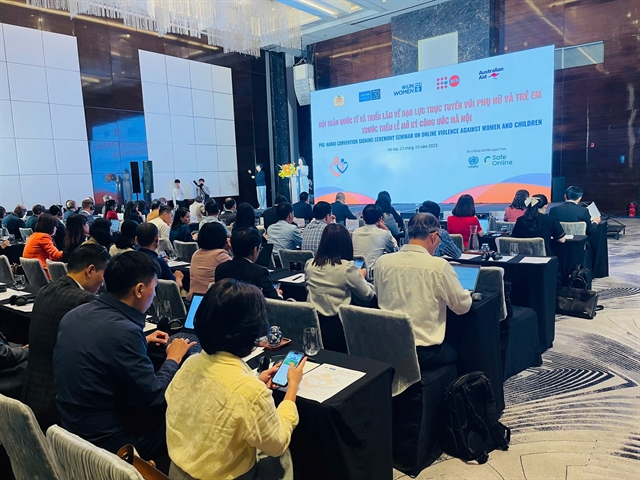 Society
Society


|
| An overview of the international seminar. — VNS Photo Thu Trang |
HÀ NỘI — Nearly nine in ten Vietnamese children aged 12–17 are active online, yet only a third have learned how to stay safe, highlighting the urgent need for stronger protections, officials said at an international seminar and gallery exhibition on online child sexual exploitation, abuse and technology-facilitated gender-based violence held on Wednesday in Hà Nội.
The event brought together policymakers, international experts, civil society and private sector leaders to shape a shared vision for a safer digital future in Việt Nam and the region.
Co-hosted by the Ministry of Public Security, the Australian Government’s Department of Foreign Affairs and Trade (DFAT), UNICEF, UN Women and UNFPA under the UN Joint Programme on Ending Violence Against Women and Children (EVAWC) funded by DFAT, the seminar highlighted both the opportunities and risks of fast-growing digital economies and societies.
Studies show many children face online harassment or exposure to sexual content, with nearly half never reporting incidents, unsure of where to turn for help. While 13 per cent of Vietnamese women have experienced sexual violence, there is still no national data on online abuse, leaving the full scale largely unseen.
Globally, 300 million children suffer online exploitation each year, and reports of enticement and sexual extortion nearly tripled last year. An estimated 38 per cent of women with internet access have personally experienced online violence. Across Asia and the Pacific, between 16 and 58 per cent of women have experienced some form of technology-facilitated abuse, underscoring the urgent need to make the digital world safer for every woman and child.
As Việt Nam hosts the signing ceremony and high-level conference for the UN Convention against Cybercrime, also known as the Hà Nội Convention, the country is promoting international exchange and learning to protect women and children in the digital era.
Cybercrime challenges
Colonel Lê Hoàng Dương, Deputy Director General of the International Cooperation Department under the Ministry of Public Security, said cybercrime is rising worldwide in scale, complexity and impact, causing an estimated US$8,000 billion in economic damage in 2023, and forecast to reach $10,500 billion this year, larger than the GDP of most major economies.
Việt Nam has one of the highest internet penetration rates in the world, with 78.44 million users, or 79.1 per cent of the population, as of early last year. In 2023, the country recorded 16,000 reports of online fraud and, as of August, more than 13,750 cyberattacks on information systems.
“Reality shows that community awareness, especially among parents and schools, about cyber safety is still low. Many acts of abuse occur anonymously, making it difficult to identify perpetrators. The emergence of new technologies such as artificial intelligence, deepfakes and fraudulent chatbots further increases the risk of abuse,” Dương said.
He called for comprehensive solutions and close coordination among stakeholders, with support from the whole society.
“The Vietnamese Ministry of Public Security affirms that it prioritises cybersecurity and combating high-tech crime, building a national legal framework to implement the Hà Nội Convention and ensuring full enforcement of its provisions, including international cooperation in combating cybercrime,” he said.
UNICEF Country Representative in Việt Nam Silvia Danailov said digital transformation is reshaping how people learn, work and connect, but these opportunities come with risks. Harms violate human rights to safety, privacy, equality and participation and demand coordinated, survivor- and child-centred systems connected through referrals, case management and shared accountability.
“The UN commends Việt Nam for its commitment to this new Convention and to the international treaties that underpin it, including the Convention on the Rights of the Child, the Elimination of All Forms of Discrimination against Women, the Convention on the Rights of Persons with Disabilities, and the International Covenant on Civil and Political Rights,” she said.
Through the Elimination of Violence Against Women and Children Programme, UN agencies and the Government of Australia are working with Việt Nam to connect these systems: training frontline responders, supporting survivor- and child-centred services, and advocating for digital safety in classrooms, clinics and communities.
“This is how Việt Nam can turn international commitments into reality for every woman, adolescent and child,” she said.
As Việt Nam advances its digitalisation and reform agenda, every ministry must make digital safety and equality central to design — safe by design, inclusive by design, empowering by design.
“Let this be the moment we affirm that digital progress and human rights are shared foundations of a modern nation. Together, we can ensure that the promise of Việt Nam’s digital future is a promise of safety, equality and dignity for all,” Danailov said. — VNS




